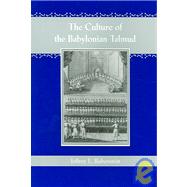
Note: Supplemental materials are not guaranteed with Rental or Used book purchases.
Purchase Benefits
Looking to rent a book? Rent The Culture of the Babylonian Talmud [ISBN: 9780801882654] for the semester, quarter, and short term or search our site for other textbooks by Rubenstein, Jeffrey L.. Renting a textbook can save you up to 90% from the cost of buying.
Jeffrey L. Rubenstein is a professor in the Skirball Department of Hebrew and Judaic Studies at New York University. He is the author of The History of Sukkot in the Second Temple and Rabbinic Periods, Rabbinic Stories, and Talmudic Stories: Narrative Art, Composition, and Culture, the last available from Johns Hopkins.
| Preface and Acknowledgments | vii | ||
| Abbreviations and Conventions | ix | ||
| Tractates | xi | ||
| Introduction | 1 | (15) | |
| Chapter 1 The Rabbinic Academy | 16 | (23) | |
| Chapter 2 Dialectics | 39 | (15) | |
| Chapter 3 Violence | 54 | (13) | |
| Chapter 4 Shame | 67 | (13) | |
| Chapter 5 Lineage and Rabbinic Leadership | 80 | (22) | |
| Chapter 6 Wives | 102 | (21) | |
| Chapter 7 Elitism: The Sages and the Amei ha'arets | 123 | (20) | |
| Chapter 8 Conclusion: The Legacy of the Stammaim | 143 | (20) | |
| Notes | 163 | (44) | |
| Selected Bibliography | 207 | (6) | |
| General Index | 213 | (14) | |
| Source Index | 227 |
The New copy of this book will include any supplemental materials advertised. Please check the title of the book to determine if it should include any access cards, study guides, lab manuals, CDs, etc.
The Used, Rental and eBook copies of this book are not guaranteed to include any supplemental materials. Typically, only the book itself is included. This is true even if the title states it includes any access cards, study guides, lab manuals, CDs, etc.